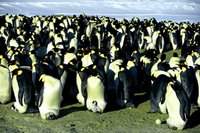Fathers nurturing role and March of the Penguins



from Wendy
This morning our interim minister was telling us about his enthusiasm for the National Geographic film ‘March of the Penguins’. He made a parallel between the care by the fathers in keeping the eggs warm as the females go away for two months searching for food. The male emperor penguins huddle and take turns in the centre, slowly moving to give everyone the chance to be really warm. Taking responsibility. Sharing responsibility. Working as a group.
An hour later when he had gone on to lead in worship elsewhere and we were drinking coffee and eating cakes (left over after the dance for people with a disability) a stranger came to the church crying. A young man with a toddler in a pusher. His partner had just left him and he had no food and no-where to live and wanted to go to his mother in Queensland. Two of our men consoled him, gave him money, and we gave him a tray of rich cakes – that’s all we had!These days, it seems to be the guys having a hard time in breakups and some end up nurturing the young rather than the mothers!
The movie:
After laying a single egg, the females make their perilous return to the fish-filled seas. The males are left behind to guard and hatch the eggs, which they cradle at all times on top of their feet, even during blinding blizzards. After two months, during which the males eat nothing, the eggs begin to hatch. But if the mothers are late returning from the ocean with food, the newly hatched chicks will die. French director Luc Jacquet followed the extraordinary journey of the penguins. Here is part of an interview with him.
How would you describe the overall theme of the movie?
I wanted to tell things more as I felt them, rather than try to describe them as a scientist. It's about the struggle between life and death. It explores the outer limits of what is possible for a creature to experience. The penguins live where no other creature can. This is what struck me the most. How do they do it? How do they manage?
Watching the movie, I was particularly struck by the fragility of the mating ritual and the lives of the penguins.
Obviously life is threatened by the slightest things, like a hole in the ice. The penguins make this incredible journey, and then everything can fall to pieces in an instant. Many don't make it. In one second, everything can be lost, and then you have to start over the following year. I wanted that [sense] to be central throughout the story—that there's never really a safe moment for the penguins.
Why do they return to the same place every year for their mating ritual?
There are four sites around Antarctica where the penguins go to mate, and they share the same characteristics. They have stable ice for the whole breeding sequence, and they are also sheltered by icebergs that can break the wind and make for somewhat easier conditions. These are like small oases.
Climate change is a major concern facing Antarctica. Why did you choose not to include any reference to the impact global warming has on the continent?
In my opinion, the best way to protect the planet is to get people to like it. One protects what one loves. It's obvious that global warming has an impact on the reproduction of the penguins. But much of public opinion appears insensitive to the dangers of global warming. We have to find other ways to communicate to people about it, not just lecture them.


0 Comments:
Post a Comment
<< Home